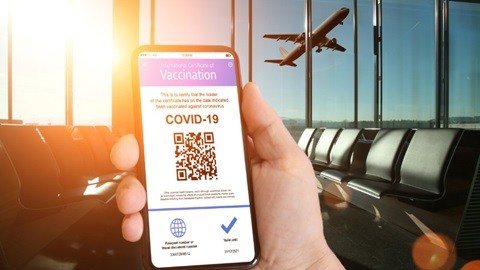As the Belgian Covid Certificate to facilitate travel within the EU was launched on Wednesday, consumer organisation Test-Achats called the Member States' lack of uniformity for the document a "missed opportunity."
The certificate - Covidsafe in Belgium - proves that someone has been fully vaccinated, has tested negative, or recently recovered after infection, and should therefore make travelling in the EU easier from 1 July.
"We wanted this European Covid certificate to be an effective and genuinely useful tool for the consumer," said Simon November, spokesperson for Test Achats, adding that this message "clearly got through" to both the European Commission and the European Parliament.
"However, the Member States have given themselves a lot of leeway on certain points, such as whether or not to accept antigen tests, the age from which the certificate is required, the different periods of validity for PCR tests or post-vaccination periods," he said.
By aiming to make travel easier and safe, the tool should also revitalise the tourism sector, which has been hard hit by the pandemic. "But all these different rules make it a complicated instrument," said November.
Related News
- EU Member States harmonise their travel rules this summer
- Belgian Covid Certificate for travel available from today: how does it work?
- Last step: EU officially signs Digital Covid Certificate for travel
To illustrate the complexity of the different rules, by using two different fictitious families, made up of two parents and two children.
"If we take the example of a family of two vaccinated parents with two children aged 2 and 4, we can say that the objective has been achieved," the organisation stated. "From 1 July, they will be able to travel anywhere in the EU without any problems."
However, the whole situation changes when only one parent is vaccinated while the other is not (yet), and the children are aged 7 and 10. "The vaccinated parent will be able to travel by presenting their certificate. For the other family members, rules will apply that are different in each country."
Some countries will accept (rapid) antigen tests, while others will only accept a PCR test taken less than 72 hours before departure, and others will require a PCR test taken 48 hours before departure.
Additionally, some countries require full vaccination at least two weeks before departure, while four weeks are needed for others, according to the organisation.
"If the family travels through several EU countries, the rules of all the countries on the route will have to be checked," said Test Achats, calling the patchwork of different rules "a Kafkaesque situation."
On Friday 11 June, the 27 Member States agreed to avoid a patchwork of different measures by harmonising their rules, but that agreement is not legally enforceable, and individual Member States can still decide to impose extra travel restrictions.
"However, it is not too late to make things right. We therefore call on Member States to agree on uniform rules before 1 July," November said. "Otherwise, this is a missed opportunity to make life easier for all travellers."

